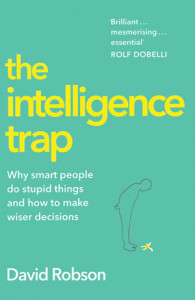The Intelligence Trap
by David Robson
Published by Hodder & Stoughton www.hodder.co.uk
“No ordinary man could be such a fool”
George Orwell
The thing about really smart people is that they are people first and really smart second. Sometimes a distant second. Starting with a decades long study of genius children and the doomed friendship between Harry Houdini and Arthur Conan Doyle, science journalist David Robson sets out to convince us that smart doesn’t always mean sensible. Honestly, it’s not a hard case to prove. He lines up studies showing nearly half of Mensa members believe in astrology or alien visitation, PhD’s make poor gamblers and people with high IQ’s are more likely to face financial distress. Overall, says Robson, the correlation between high IQ and rationality is very weak. We even have a word for it; dysrationalia – an inability (or disinclination) to think straight.
At the opposite end of the Dunning Kruger scale, the highly intelligent face a bunch of cognitive biases of their own and when clever people are wrong they can be wrong big time. Robson quotes a scary statistic of 80,000 deaths a year in US hospitals being due to misdiagnosis and tells the story of Brandon Mayfield, a US lawyer arrested for the Madrid Train bombings. Two experts mismatched his fingerprints and investigators even mistook his daughter’s Spanish homework for travel documents placing him at the scene. An inability to learn from mistakes is also prevalent. A dozen, nearly identical, close shaves preceded the Deepwater Horizon blowout as well as the Air France Concorde crash in 2000.
All of these cognitive flaws – and many, oh so many, more – are nothing new. Writers and philosophers have been lamenting them for millennia. Robson namechecks Scorates, Descartes and George Orwell and while I was reading on the train, Simon & Garfunkle chimed in with their own take; “a man hears what he wants to hear and disregards the rest” courtesy of my iPod’s playlist! But while the problems are ago-old, what is new is that science, rather than art, is being brought to bear on them. Research is rooting out how and why these errors occur. How often and under what exact circumstance are biases likely to show up? Spoiler: ‘everywhere’ and ‘all the time’. “The people who think they are already immune are probably most at risk”, says Robson. He owns up to his own shortsightedness and even in the midst of reading a book about cognitive biases I managed to galumph straight into an egregious example of my own (buy me a drink sometime and I’ll tell you all about it). All is not lost though. Robson spends the better half of the book recounting a variety of procedures and practices that various organisation have developed to counter bias effects.
In places he sounds like some New Age guru when he talks about ‘mindfulness’ and ‘evidence-based wisdom’ but bare with it, there’s plenty of practical advise too. Thinking a problem through in a second language mutes emotional responses. Doodling as you talk improves your memory. Jotting down your gut reaction and analysing evidence for it afterward improves accuracy. Arguing both sides of a problem – like a solo chess game – gives you a wider appreciation of opposing positions. Even just a little humility can go a long way to preventing errors – you’re probably right but what if, on this one occasion, you weren’t? On a wider scale, Robson explores anti-bias systems put in place by the US navy and Nuclear power industry that have massively reduced human error.
Our intelligence is broadly a matter of biology but, says Robson, how to avoid its drawbacks and use it to its greatest advantage is a wisdom we can, and should, all learn.
